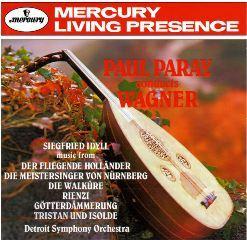Wagner - Siegfried Idyll (Paray Conducts Wagner) [1996]
Wagner - Siegfried Idyll (Paray Conducts Wagner) [1996]

1. Der Fliegende Hollander, Oveture 2. Die Meistersinger von Nurnberg, Suite 3. Die Wlakure, Wotan's Farewell and Magic Fire Music 4. Rienzi, Overture 5. Gotterdammerung, Dawn and Siegfried's Rhine Journey 6. Siegfried Idyll 7. Tristan und Isolde, Prelude to Act III Detroit Symphony Orchestra Paul Paray - conductor
While Germany and France may be geographic neighbors, their cultures (and politics) are as far apart as can be.Paul Paray and the Detroit Symphony play Wagner One would expect Paray, a quintessential French conductor, to either avoid, be indifferent to, or stumble badly over the works of the key German composer. And yet, this is one of the very best Wagner compilations around. It begins with a Flying Dutchman Overture that is ardent, beautifully played and shorn of interpretive rhetoric. The Meistersinger Suite is not the standard overture, but a combination of the wistful Act III Prelude, the playful dance of the apprentices, and then the monumentally powerful music in praise of the master-singers which concludes the overture (and, ultimately, the opera); this progression makes perfect sense, both musically and dramatically, depicting the melancholy of age worrying over the future, alleviated by faith in the children in whose hands the future will lie, and sealed by a statement of decisive leadership of the current generation. The otherwise well-conceived program concludes on a bizarre note (literally) – the final selection is the Prelude to Act III (not the more common Prelude to Act I) of Tristan, which wallows in grief and then simply cuts off a plaintive and poignant solo oboe passage; it’s deeply moving, but a rather bizarre choice and a musical downer. Reprogramming the last two tracks, so that the Prelude leads into the lovely Siegfried Idyll, works much better. ---Peter Gutmann, classicalnotes.net
Paul Paray (1886-1979) was famous for his Wagner as much as anything else he conducted. He was never at Bayreuth, but listening to this disc you wonder why. Since he was a Resistance higher-up during the war, Bayreuth may have proved a bit repressive for him. We may never know.
What we do know is that his approach to Wagner was very much that of an operatic practioner. His Ring at the Paris Opera was a big attraction during the 1920s. Here we get an idea of what it must have been like: dramatic, sweeping, fresh, vital, above all, human. Paray obviously knew how build dramatic scenes: he gets a move-on and doesn't let the gods dabble around brandishing spears. There's work to do and places to go, and the result is remarkably individual without in any way disfiguring the scores for "effect" or "uniqueness." Paray gives you what he sees and hears and it's exciting, unlike any other Wagner you've experienced.
This would get five stars if the Detroit Symphony had been hitting on all 8 cylinders, but we get some string slop and brass bleeps, unusual for the orchestra at this time. Some problems have been edited: if you own this in its first vinyl release from '58 or so like I do, the Parsifal contains a horrendous goof from trumpets not in evidence here...and some other botched moments are snipped out, too.
The Siegfried Idyll won't appeal to Teutonic tastes that want to wallow in chocolatey sentiment. Paray is the only conductor to treat it as the greeting card it was intended to be, an occasional piece written for Cosima at the birth of their son, not an artistic manifesto for the ages to ponder. Let's hope Mercury finds it worth issuing some of Paray's monaural Wagner which would add immeasurably to his legacy and supplement this excellent collection. If you're interested in a great Wagner tradition, you MUST get this. ---Mark McCue, amazon.com
download (mp3 @320 kbs):
uploaded yandex 4shared mega mediafire zalivalka cloudmailru oboom uplea








